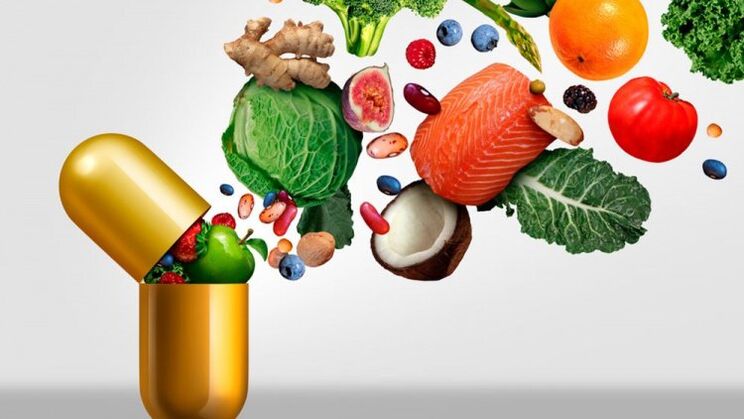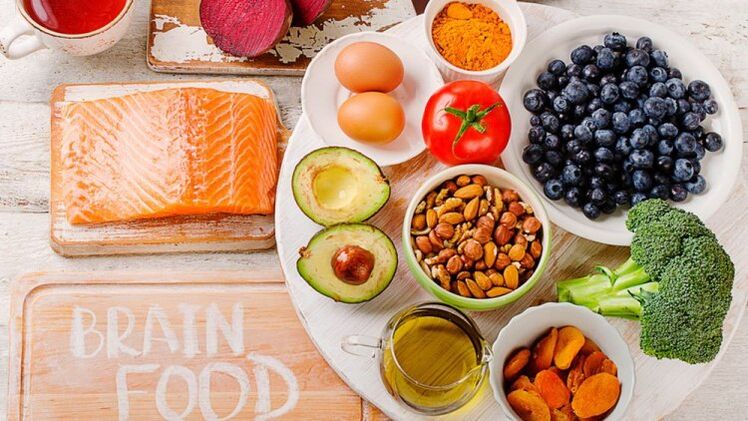An insufficient amount of vitamins in the human body negatively affects the activity of the brain and leads to disorders of cognitive functions. The main signs of vitamin deficiency are the loss of the ability to perceive and remember information, deterioration in attention, forgetfulness, absent-mindedness, lethargy, fatigue, bad mood.
To prevent this condition, take vitamins regularly and supplement your diet with foods that improve brain function.
What role do vitamins play?
The root of the word "vitamins" means life. In fact, the body's ability to function properly and productively depends on what organic substances we ingest with food.
Vitamins help the body perform the following functions:
- They produce collagen, which strengthens and improves the strength and elasticity of tissues, including the vessel walls. This leads to improved blood formation and nourishes the brain.
- Promote the acceleration of redox reactions, thereby increasing the metabolism and releasing energy from proteins, fats and carbohydrates.
- They have antioxidant properties and prevent cells from being destroyed by the products of biochemical reactions.
In order to maintain the active work of the brain, it is necessary to constantly monitor the vitamin and mineral balance. And in the event of a deficiency, replenish the vitamin reserves by choosing the right food and taking vitamin complexes with various low molecular weight organic compounds.
What vitamins does the brain need

Brain cognitive dysfunction is more common with age. The reasons that provoke this condition include endocrine disorders (thyroid gland, metabolism), diseases of the digestive system, frequent stress and excessive physical activity, which requires huge energy bills. In this case, vitamins should come to the rescue. Among the large number of them, we can single out the most important ones that ensure the effective work of the brain. These include:
Beta carotene
Yellow-orange pigment that converts to vitamin A. Protects brain cells, prevents loss of cognitive function, promotes memory development. Lack of pigment threatens pathologies of the organs of vision, negatively affects growth and development in childhood.
vitamin B
They are represented by a whole group, and each of their representatives is of great importance to the human body:
- Thiamine (B1) helps in the absorption of carbohydrates and stores energy, its deficiency destroys the digestive system;
- Riboflavin (B2) promotes effective oxygen uptake, relieves tiredness, and supplies the body with energy;
- Nicotinic acid (B3) - a powerful antioxidant, dilates blood vessels, is used for circulatory disorders;
- Pantothenic acid (B5) - participates in the metabolism of proteins, fats, carbohydrates, synthesizes acetylcholine and helps transmit nerve impulses to the brain;
- Pyridoxine (B6) - produces hormones responsible for cognitive processes, synthesizes enzymes that break down proteins and are necessary for the formation of new cells;
- Folic acid (B9) - promotes cell reproduction, the formation of serotonin, adrenaline, dopamine, is needed by pregnant women for the development of a pregnant fetus;
- Cyanocobalamin (B12) - lowers bad cholesterol, strengthens the vascular walls, participates in the synthesis of amino acids and DNA.
Ascorbic acid (vitamin C)
It prevents brain cells from degenerating, helps the gland to be better absorbed. In combination with tocopherol, it is used to treat pathologies associated with impaired blood supply and reduce the risk of developing a malignant tumor.
Calciferol (vitamin D)
It activates the absorption of phosphorus and calcium, which are part of brain cells, improves cognitive abilities (memory, attention), mood. The lack of this organic compound becomes the cause of the development of cognitive impairments.
Vitamin K
It is represented by a group of fat-soluble compounds - phylloquinone (K1) and menaquinone (K2), which are responsible for blood vessel function and clotting. Thanks to him, calcium is more easily absorbed. The deficiency threatens clogging of blood vessels, the development of amnesia and a violation of hematopoiesis.
Tocopherol (vitamin E)
As a powerful antioxidant, it protects nerve cells from toxins and free radicals, improves memory properties and slows down aging.
Polyunsaturated fats - the so-called omega-3 fats - also have an effect on the performance of the brain. They affect neuroplasticity, increase concentration and reduce the risk of developing Alzheimer's.
Foods for better brain function

The main activity of the brain is transmitting commands to carry out the vital functions of the body. In order to maintain a well-coordinated work, he needs good nutrition. The foods eaten should contain beneficial vitamins and minerals.
Here is a list of healthy brain foods to include in your diet on a regular basis:
- Nuts (walnuts, pine nuts, almonds): contain polyunsaturated acids, vitamins B1, B2, C, carotene and iron, iodine, magnesium, zinc, etc. They prevent the body from aging prematurely and activate the brain.
- Berries (blueberries, blackberries, cranberries, strawberries): improve memory and eyesight, prevent diseases of the heart and blood vessels, increase efficiency.
- Eggs (Chicken, Quail): Rich in lutein, which prevents heart attacks and strokes from developing. Doctors recommend eating no more than 2 pieces a day.
- High-quality dark chocolate: in moderation, it stimulates the activity of the brain, improves the supply of oxygen, dilates the blood vessels. The magnesium and phosphorus it contains contribute to the nutrition of the cells.
- Carrots: Inhibits aging by preventing brain cells from being destroyed.
- Beetroot: Increases blood flow to the brain and helps improve mental performance.
- Algae: contains iodine, which helps fight irritability, insomnia, depression, amnesia.
- Oily sea fish (mackerel, salmon, tuna): a source of polyunsaturated omega-3 fatty acids - good for the brain.
- Chicken, turkey, beef: contains protein, selenium and B vitamins.
- Spinach: a real supply of vitamins A, C, K, as well as iron - prevents the development of heart attacks and strokes.
- Legumes (lentils, beans): Provide a clear mind and quick thinking.
In order to organize the full functioning of the brain, it is necessary to follow the recommendations of nutritionists:
- do not overeat - overeating contributes to the formation of free radicals that adversely affect brain cells;
- eat fractionated small portions - 5-6 meals a day;
- Fish in the diet should be at least three times a week;
- complex carbohydrates, fresh vegetables and fruits should be consumed daily until 4: 00 p. m.
- Avoid alcohol, caffeine, fatty foods, sweet and flour products.
Adhering to the work and rest program, an active lifestyle, a balanced diet and the intake of vitamin and mineral complexes will keep your brain healthy for a long time.







































































